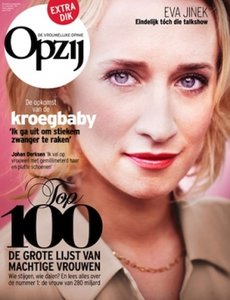Opzij
 October 2011 issue featuring Eva Jinek | |
| Editor | Marianne Verhoeven[1] |
|---|---|
| Former editors | Margriet van der Linden |
| Frequency | Monthly |
| Founded | 1972 |
| First issue | November 1972 |
| Company | Veen[1] |
| Country | Netherlands |
| Language | Dutch |
| Website | opzij.nl |
| ISSN | 0166-2007 |
Opzij is a mainstream Dutch feminist monthly magazine. The title means "out of the way!"[2]
History and profile[edit]
Opzij was founded as a radical feminist magazine in November 1972[3][4] by Wim Hora Adema (1914–1998) and Hedy d'Ancona (1937). A former editor was Cisca Dresselhuys, who retired in 2008; the current editor (2009) is Margriet van der Linden. The magazine calls itself the "only opinion magazine for women," and considers itself a part of the women's movement.[5] It is published on a monthly basis.[6]
The magazine currently contains articles about women and women's issues, as well as "lifestyle" sections. It also has a reputation for publishing stories about and studies of female sexuality in the Netherlands.[7] For many years, Opzij was a yardstick to measure Dutch women's attitudes; for instance, a 2002 study investigated Dutch women's opinions on relationships and sexuality based largely on empirical evidence of the changes Opzij and its readership have experienced since its founding.[2] The publisher and owner of the magazine was Weekbladpers.[8]
In 2014, its owner, Weekbladpers, sold the magazine as part of an organizational restructuring prompted by declining sales numbers for magazines. NRC Handelsblad reported Opzij's circulation as 44,000 copies in May 2014, down about 50% over the previous decade. The new owner, Veen Media, employs some thirty-five people, five of which with Opzij.[1] Veen had been publishing popular-science magazines, including New Science; that magazine's editor, Irene van Bel, succeeded Daphne van Paassen (interim editor since 2003, after the departure of Margriet van der Linden) at Opzij.[9]
Harriet Freezerring[edit]
Since 1978 Opzij awards an emancipation award named for Dutch journalist and author Harriët Freezer.[10] Notable winners include Nahed Selim (2006), Elsbeth Boor and the Clara Wichmann Institute (2005), Ayaan Hirsi Ali (2004), Hedy d'Ancona (1992), and Ellen 't Hoen (1989).
References[edit]
- ^ a b c "Irene de Bel wordt de nieuwe hoofdredacteur van Opzij". NRC Handelsblad (in Dutch). 20 May 2014. Retrieved 20 May 2014.
- ^ a b Cas Wouters, "Changes in the 'Lust Balance' of Sex and Love since the Sexual Revolution: The Example of the Netherlands," in Kenneth Plummer (2002). Sexualities: Some elements for an account of the social organization of sexualities. Taylor & Francis. pp. 37–59. ISBN 978-0-415-21274-8.
- ^ David Machin; Theo Van Leeuwen (17 May 2007). Global Media Discourse: A Critical Introduction. Routledge. p. 39. ISBN 978-1-134-24090-6. Retrieved 16 May 2015.
- ^ "Women's Liberation Movement (100)". Grossroots Feminism. Retrieved 8 January 2016.
- ^ According to Cisca Dresselhus, in Nico Drok (2006). De toekomst van de journalistiek. Boom. ISBN 978-90-8506-308-7.
- ^ Lotte Kamphuis (21 August 2014). "Why an Iconic Dutch Women's Magazine Is Ditching 'Feminist' for 'Feminine'". ProJourno. Retrieved 28 June 2016.
- ^ Cas Wouters (2004). Sex and manners: female emancipation in the West, 1890-2000. SAGE. pp. 128–136. ISBN 978-0-8039-8369-4.
- ^ Jacco Hakfoort; Jürgen Weigand. "Magazine Publishing - A Quiet Life? The Dutch Market for Consumer Magazines" (PDF). Centraal Plan Bureau. Retrieved 1 November 2014.
- ^ Takken, Wilfred (6 January 2014). "Tijdschrift Opzij lijkt gered: overname nabij". NRC Handelsblad (in Dutch). Retrieved 20 May 2014.
- ^ Complete list of winners
